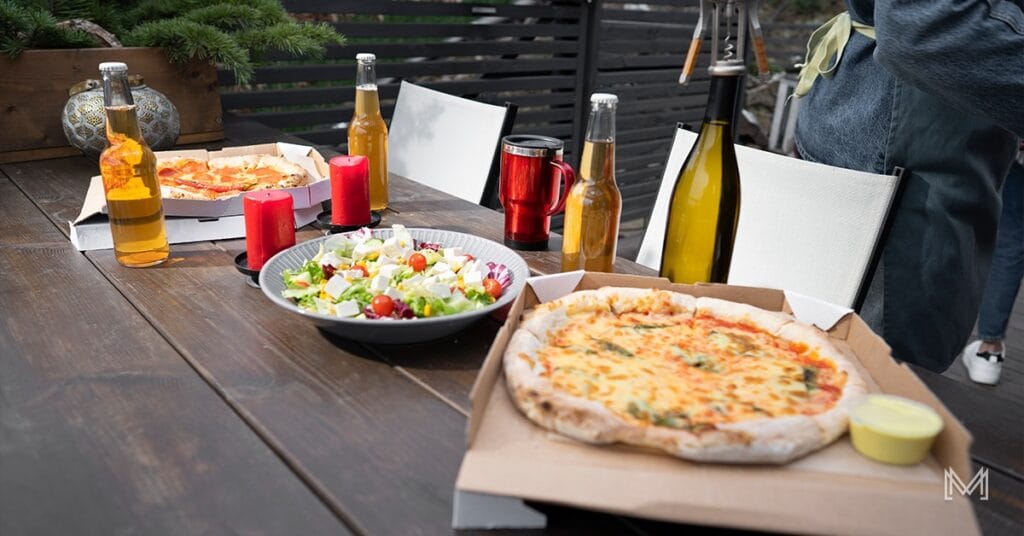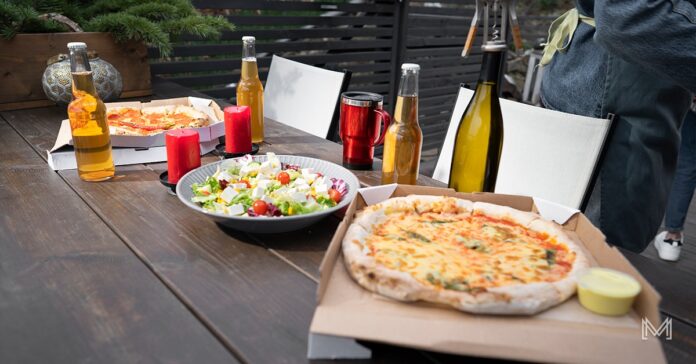Slice of Success: A Guide to Start a Pizza Business in South Africa
The Aroma of Opportunity
A successful pizza company is defined by the aroma of freshly prepared pizza, the satisfying crunch of a crust, and the enticing combination of tastes. Start a pizza business it is impossible to deny the potential for success in this industry in South Africa, where pizza is the most popular comfort meal and reigns supreme because of its popularity.
Many South Africans have pizza on their tables, whether they are enjoying a quiet family supper or hosting a celebration. To start a pizza business, however, it is not enough to just become an expert in the art of dough-making; one must also have a strategic strategy in order to successfully navigate that competitive market. This comprehensive book will provide you with the necessary information and insights to turn your passion for pizza into a profitable business venture.

Understanding the pizza landscape
Before delving fully into the world of pizza, it is essential to have a solid understanding of the competition that exists in the South African industry.
The Rise of the Pizza Empire:
The South African pizza industry is thriving, and well-established franchises such as Debonairs, Pizza Hut, and Domino’s are the most prominent players in the industry. Because these giants have established a dedicated consumer base, it is critical for newcomers to identify their own unique selling offer in order to compete successfully.
Beyond the Big Players:
Compared to the franchises, there is a flourishing ecosystem of independent pizza restaurants that cater to certain demographics and types of customers. It is common for these businesses to thrive by providing customised pizzas, one-of-a-kind ingredients, or a unique environment, which demonstrates the potential for differentiation.
The Pizza-Loving Consumer:
Individuals who are passionate about pizza in South Africa have a wide range of tastes, which include anything from traditional pepperoni to unusual toppings and gourmet innovations. To achieve success, it is essential to understand these preferences and adjust your services accordingly.
A Slice of Reality: Challenges and Opportunities
Competition:
A well-defined strategy is required in order to successfully navigate the competitive environment. Despite the fact that major chains dominate the market, individual pizza restaurants have the ability to carve out a specific niche for themselves by providing specialist services, distinctive toppings, or a dining experience that is unique.
Rising Costs:
The ever-increasing costs of rent, utilities, and supplies pose a significant obstacle to profitability. However, strategic sourcing, efficient operations, and judicious menu pricing can reduce these expenses.
Loyalty of the consumer:
Developing a consumer base that is loyal to your brand is essential for long-term success. Reliable quality, outstanding customer service, and an unforgettable dining experience are all possible outcomes.
The Recipe for Success: A Step-by-Step Guide Start a Pizza Business
The process of beginning a pizza company in South Africa consists of a set of phases that are clearly defined. The purpose of this book is to give you a detailed road map that will lead you through the procedure.
1. Choose Your Business Model: Franchise or Independent?
Franchise Advantage:
- Brand Recognition: Tap into a well-known chain’s established brand equity to attract customers familiar with their menu and quality.
- Proven Systems: Benefit from established operational systems, marketing strategies, and supplier networks.
- Training and Support: Receive comprehensive training and ongoing support from the franchisor.
Franchise Disadvantage:
- Strict franchise guidelines govern operations, which limits your flexibility and creativity.
- Royalty Fees: The franchisor is required to pay ongoing royalty fees, which are impacted by profitability.
- Reputational Risk: Even if your business is independent, actions by other franchisees can have a negative impact.
Independent Advantage:
- Full Control: Flexibility to personalise your menu, create your own brand identity, and adapt to local preferences.
- Greater Profitability: Keep all profits without paying franchise fees.
- Unique Positioning: Differentiate your business from the competition by offering unique pizza varieties, special ingredients, or a distinctive dining atmosphere.
Independent Disadvantage:
- Building brand awareness necessitates a significant amount of effort to establish your brand and attract customers.
- Developing Systems: Invest in creating efficient operational systems and marketing strategies from scratch.
- Managing Risk: Bear all the risks associated with starting a new business, including financial instability and operational challenges.

2. Creating Your Perfect Pizza: Choosing Your Specialty
- Classic Choices: Offer traditional favourites like Margherita, Pepperoni, and Hawaiian pizzas to appeal to a wide audience.
- Gourmet Delights: Indulge in a higher-end market by creating unique pizzas with gourmet toppings and innovative flavor combinations.
- Themed Creations: Introduce pizzas inspired by different cuisines, regions, or cultural influences to capture the imagination of diverse customers.
- Vegetarian and Vegan Options: cater to the growing demand for plant-based options with innovative toppings and gluten-free crusts.
- Unique Selling Proposition: Identify a specific niche or specialisation to differentiate your pizza business.
3. Location, Location, Location: Discovering Your Perfect Place
- Foot Traffic: Seek out high-traffic areas like shopping malls, busy streets, or university campuses to maximise exposure to potential customers.
- Accessibility: Ensure convenient parking and simple access for customers, particularly for delivery services.
- Pizza competition: Consider your local pizza competition and ability to stand out.
- Assess rental costs and compare them to potential revenue streams to ensure long-term viability.
- Target Audience: Choose a location that aligns with your target customer’s demographic and spending habits.
4. The Right Ingredients: Obtaining Licenses and Permits
- Business Registration: Formally register your business with the Companies and Intellectual Property Commission (CIPC).
- Food Safety Regulations: Comply with the Foodstuffs, Cosmetics, and Disinfectants Act, 1972, as well as the regulations that ensure safe and hygienic food preparation practices.
- Health and Safety Permits: Obtain the necessary permits from local authorities to operate a food establishment.
- Zoning Compliance: Ensure that your business complies with local zoning regulations for food service businesses.
- Insurance Coverage: Secure business insurance to protect your business from potential risks, including liability, property damage, and employee injury.
5. Building Your Dream Pizzeria: Designing Your Space
- Functionality: Design a layout that prioritises efficiency, maximising space for food preparation, customer service, and seating.
- Atmosphere: Create a welcoming and comfortable atmosphere that reflects your brand identity and target audience.
- Seating Arrangements: Consider a mix of seating options, including tables, booths, and bar seating, to accommodate different dining preferences.
- Kitchen Equipment: Invest in high-quality ovens, pizza preparation equipment, and refrigeration to ensure efficient operations and consistent pizza quality.
- Visual Appeal: Use attractive décor, lighting, and signage to create a visually appealing space that enhances the dining experience.
6. The Art of Pizza Making: Hiring and Training Your Team
- Passionate and Skilled: Look for employees who are passionate about pizza and have experience in food service, particularly pizza preparation.
- Training: Provide comprehensive training on pizza making, food safety practices, and customer service to ensure consistency and a high-quality experience.
- Teamwork: Foster a collaborative work environment where employees can share ideas, learn from each other, and support one another.
- Leadership: Lead by example and cultivate a positive work environment that motivates employees and fosters excellence.
7. The Pizza Menu: Crafting Your Culinary Delights
- Variety: Offer a diverse range of pizzas to cater to different tastes and dietary preferences.
- Signature Pizzas: Create unique and innovative pizzas that showcase your culinary creativity and set you apart from the competition.
- Price Points: Strategically price your pizzas to be competitive while ensuring profitability.
- To enhance the dining experience, offer complementary side dishes like salads, wings, and garlic bread.
- Dessert Options: To satisfy sweet cravings, include tempting desserts like cannolis, tiramisu, and gelato.
8. Marketing and Advertising: Spreading the Word
- Online Presence: To engage potential customers, establish a strong online presence with a user-friendly website and active social media pages.
- Local Marketing: Use targeted advertising in local newspapers, community magazines, and online platforms to reach your local customer base.
- Promotional Offers: Run special promotions, discounts, and loyalty programmes to attract new customers and encourage repeat business.
- Delivery Services: To expand your reach and convenience, partner with delivery services such as Uber Eats and Mr. D Food.
- Community Engagement: To raise awareness of your business and keep customers coming back, take part in local events, donations, and community projects.
9. The Customer Experience: Providing Exceptional Service
- Fast and Efficient: Strive for swift service to ensure a positive dining experience, particularly during peak hours.
- Friendly and Attentive: Train staff to greet customers warmly, be knowledgeable about the menu, and provide helpful recommendations.
- Cleanliness and Hygiene: To ensure customer health and well-being, maintain a clean and sanitised environment to ensure the health and well-being of customers.
- Feedback and Improvement: Actively seek customer feedback and implement suggestions to improve service and product quality.
10. Keeping Your Business Afloat: Managing Finances
- Budgeting: Create a detailed budget to track income, expenses, and profitability.
- Inventory Management: Maximise inventory control to reduce waste and maintain freshness.
- Pricing Strategy: Strategically set prices to ensure profitability while remaining competitive.
- Financial Reporting: Regularly review financial statements to identify areas for improvement and make informed business decisions.
The Final Slice: A Delicious Journey to Success
Start a pizza business in South Africa is a challenging but rewarding venture. By following this guide, you can equip yourself with the knowledge and tools to navigate the complexities of the market and craft a successful pizza empire. Remember, passion for pizza, a well-defined strategy, and a commitment to excellence are the key ingredients for a slice of success.
Table: Comparing Franchise vs. Independent Pizza Business
| Feature | Franchise | Independent |
|---|---|---|
| Brand Recognition | High | Low |
| Operational Systems | Established | Develop from scratch. |
| Marketing Strategies | Proven | Create your own. |
| Training and support | Provided by the franchisor | Self-managed |
| Control | Limited | Full |
| Profitability | Lower (due to royalties) | Higher |
| Risk | Lower (established brand) | Higher (new business) |
Resources: Start a Pizza Business
- Companies and Intellectual Property Commission (CIPC): https://www.cipc.co.za/
- Department of Health: https://www.health.gov.za/
- South African Revenue Service (SARS): https://www.sars.gov.za/
- Uber Eats: https://www.ubereats.com/
- Mr. D. Food: https://www.mrdfood.co.za/
Remember: This guide provides a starting point for your pizza business journey. Each business is unique and requires individual attention to detail and strategic planning. By combining passion, knowledge, and hard work, you can create a thriving pizza business that satisfies the taste buds and wins the hearts of South African pizza lovers.

Frequently Asked Questions: Start a pizza business
1. How much does it cost in South Africa to open a pizza shop? In South Africa, the cost of opening a pizza business can change a lot based on where it is located, how big it is, and the type of business it is. The following is a list of possible costs:
- Franchise Fees: If you choose to buy a franchise, you will have to pay initial franchise fees, ongoing royalty fees, and maybe even marketing fees. These can be anywhere from R100,000 to R500,000 or even more.
- Rent: Depending on the area and size, the monthly rent for a desirable spot can be anywhere from R10,000 to R50,000 or more.
- Renovations: Making a place fit for a pizzeria can cost a lot of money. Plan for the prices of renovations, such as plumbing, electrical work, floors, and cooking appliances.
- Things you need: Depending on the size and features, buying pizza ovens, work tables, freezers, and other important things can cost anywhere from R100,000 to R500,000.
- Initial inventory: Set aside between R20,000 and R50,000 to buy extra goods, packing supplies, and other supplies.
- Marketing and Advertising: Set aside money for building a website, marketing on social media, and running local ads. A budget of between R10,000 and R30,000 is a suitable range for the first marketing attempts.
2. What do I need to do legally to start a pizza business in South Africa? Here are the most important legal steps:
- Register your business. Make sure that the Companies and Intellectual Property Commission (CIPC) has a record of your business.
- Get Food Safety Permits: Follow the Foodstuffs, Cosmetics, and Disinfectants Act of 1972 to obtain the permits you require from the local government.
- Get a Health Certificate: Make sure that everyone who works in your restaurant has the right health certificates.
- Follow the rules for zoning: Make sure the place you want to open is allowed to have a food service business.
- Get Insurance: Make sure your business has coverage to cover things like liability, property loss, and injuries to employees.
3. What are the most common things to put on pizza in South Africa? South African pizza enthusiasts enjoy a wide variety of options, but these are some of the most popular ones: Start a pizza business
- Pepperoni is always a safe bet and a crowd favourite.
- Ham and pineapple is a standard pairing, but it doesn’t always go over well.
- Chicken and mushroom is a popular and tasty choice.
- A standard vegetable mix is mushrooms, onions, and peppers.
- Meat Lovers: A mix of different meats, like beef, gammon, and salami.
- Cheese and garlic are a simple but tasty pick.
- Lots of people in South Africa like pizza with chilli, jalapeños, or other spicy toppings.
4. What are some ways to make people aware of your South African pizza business?
- Build a Strong Online Presence: Create a professional website and use social media to showcase your food, attract new customers, and foster a community.
- Pay attention to local ads. To reach your direct customers, use local newspapers, neighbourhood magazines, and focused online platforms.
- Use Delivery Services: To reach more people and make things easier for them, work with delivery services like Uber Eats and Mr. D Food.
- Offer Deals and Discounts: To attract new people and keep old ones, use deals, discounts, and reward programs.
- Get involved in the community: To raise awareness of your brand and encourage loyalty, participate in local events, donations, and community projects.
5. What are some problems that South African pizza shops often have?
- Competition: There are a lot of established chains and private pizzerias in the market, so it’s important to make your business stand out.
- Costs going up: The price of food, gas, and rent can affect how much money you make. Take steps to save money, and set prices for your food in a smart way.
- Staff Retention: Finding and keeping skilled and trustworthy employees can be hard. It is crucial to offer competitive rates, perks, and opportunities for learning to ensure employee retention.
- Meeting Customer Expectations: Pizza fans in South Africa are picky. To get people to stick with you, focus on quality that doesn’t change, fresh products, and outstanding customer service.

